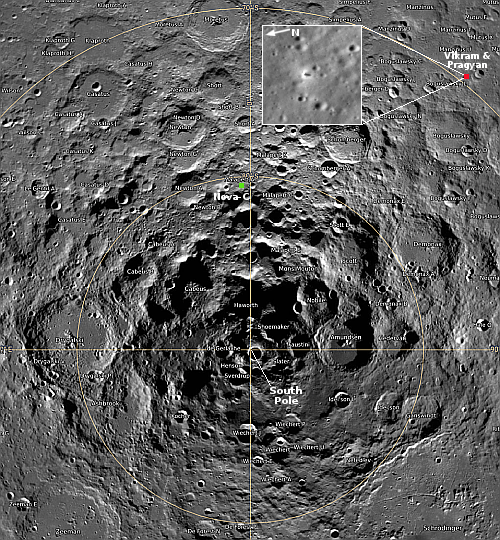Pragyan data confirms theory that the Moon’s surface was once largely covered with molten lava oceans

Vikram as seen by Lunar Reconnaissance Orbiter.
Click for interactive map. To see the original
image, go here.
Data from India’s Pragyan lunar rover that landed in the high southern latitudes of the Moon in August 2023 has now confirmed the theory that the Moon’s surface was once largely covered with molten lava oceans.
Santosh Vadawale, an X-ray astronomer at the Physical Research Laboratory in Ahmedabad, India, and his colleagues analysed radiation data collected by the APXS [one of Pragyan’s instruments], and used this information to identify the elements in the regolith and their relative abundances, which, in turn, revealed the soil’s mineral composition. The team found that all 23 samples comprised mainly ferroan anorthosite, a mineral that is common on the Moon. The results were reported in Nature today.
“It’s sort of what we expected to be there based on orbital data, but the ground truth is always really good to get,” says Lindy Elkins-Tanton, a planetary scientist at Arizona State University in Tempe.
Previous landers obtained similar results. However, the Chandrayaan-3 samples are the first from the subpolar region: previous landers visited equatorial and mid-latitude zones. Together, this suggests that the composition of the regolith is uniform across the Moon’s surface.
These results are no surprise, but they confirm the global nature of the Moon’s early molten history. More important, they demonstrate that India now has the capability to send landers and rovers to other planets that are also capable of doing real research.
On Christmas Eve 1968 three Americans became the first humans to visit another world. What they did to celebrate was unexpected and profound, and will be remembered throughout all human history. Genesis: the Story of Apollo 8, Robert Zimmerman's classic history of humanity's first journey to another world, tells that story, and it is now available as both an ebook and an audiobook, both with a foreword by Valerie Anders and a new introduction by Robert Zimmerman.
The print edition can be purchased at Amazon or from any other book seller. If you want an autographed copy the price is $60 for the hardback and $45 for the paperback, plus $8 shipping for each. Go here for purchasing details. The ebook is available everywhere for $5.99 (before discount) at amazon, or direct from my ebook publisher, ebookit. If you buy it from ebookit you don't support the big tech companies and the author gets a bigger cut much sooner.
The audiobook is also available at all these vendors, and is also free with a 30-day trial membership to Audible.
"Not simply about one mission, [Genesis] is also the history of America's quest for the moon... Zimmerman has done a masterful job of tying disparate events together into a solid account of one of America's greatest human triumphs."--San Antonio Express-News

Vikram as seen by Lunar Reconnaissance Orbiter.
Click for interactive map. To see the original
image, go here.
Data from India’s Pragyan lunar rover that landed in the high southern latitudes of the Moon in August 2023 has now confirmed the theory that the Moon’s surface was once largely covered with molten lava oceans.
Santosh Vadawale, an X-ray astronomer at the Physical Research Laboratory in Ahmedabad, India, and his colleagues analysed radiation data collected by the APXS [one of Pragyan’s instruments], and used this information to identify the elements in the regolith and their relative abundances, which, in turn, revealed the soil’s mineral composition. The team found that all 23 samples comprised mainly ferroan anorthosite, a mineral that is common on the Moon. The results were reported in Nature today.
“It’s sort of what we expected to be there based on orbital data, but the ground truth is always really good to get,” says Lindy Elkins-Tanton, a planetary scientist at Arizona State University in Tempe.
Previous landers obtained similar results. However, the Chandrayaan-3 samples are the first from the subpolar region: previous landers visited equatorial and mid-latitude zones. Together, this suggests that the composition of the regolith is uniform across the Moon’s surface.
These results are no surprise, but they confirm the global nature of the Moon’s early molten history. More important, they demonstrate that India now has the capability to send landers and rovers to other planets that are also capable of doing real research.
On Christmas Eve 1968 three Americans became the first humans to visit another world. What they did to celebrate was unexpected and profound, and will be remembered throughout all human history. Genesis: the Story of Apollo 8, Robert Zimmerman's classic history of humanity's first journey to another world, tells that story, and it is now available as both an ebook and an audiobook, both with a foreword by Valerie Anders and a new introduction by Robert Zimmerman.
The print edition can be purchased at Amazon or from any other book seller. If you want an autographed copy the price is $60 for the hardback and $45 for the paperback, plus $8 shipping for each. Go here for purchasing details. The ebook is available everywhere for $5.99 (before discount) at amazon, or direct from my ebook publisher, ebookit. If you buy it from ebookit you don't support the big tech companies and the author gets a bigger cut much sooner.
The audiobook is also available at all these vendors, and is also free with a 30-day trial membership to Audible.
"Not simply about one mission, [Genesis] is also the history of America's quest for the moon... Zimmerman has done a masterful job of tying disparate events together into a solid account of one of America's greatest human triumphs."--San Antonio Express-News

